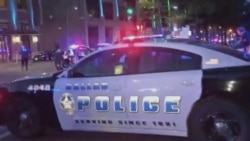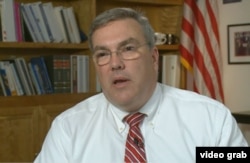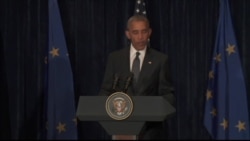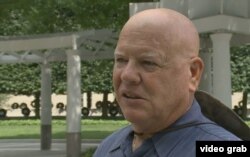Ed Harder is thinking about the blue shirts that made the police officers in Dallas targets.
He circles the handwritten notes and flowers at the center of the National Law Enforcement Memorial here that memorialize the five dead and seven wounded at the end of an otherwise peaceful Black Lives Matter protest in downtown Dallas.
Even as details emerged about the shootings Thursday night, a familiar battle erupted online. The blue shirts of police became the hashtag Blue Lives Matter, sometimes competing with the now-familiar hashtag Black Lives Matter, while others decried any labels, using the phrase All Lives Matter.
Harder wore the police uniform for seven years. He says his heart dropped when he heard the news about Dallas and imagined being in the position of the police officers guarding people exercising their right to free speech.
"You lost your life because of what you were wearing: a blue shirt. No other reason. You were wearing a blue shirt," said Harder, shaking his head. "So black lives matter, blue lives matter? No. All lives matter."
The simple pledge that all lives matter seems straightforward. It is an acknowledgement that labels sometimes can mislead. In the ongoing and difficult American discussion on race, however, even a lack of labels can be a problem.
Problem of labels
Earlier in the day, President Barack Obama confronted the question of labels as he reacted to the shootings.
"When people say black lives matter, it does not mean blue lives don’t matter. All lives matter," Obama said.
The president also acknowledged the concerns of Black Lives Matter protesters, though, who say race plays a role in policing in the United States.
"The big concern is that the data shows that black folks are more vulnerable to these kinds of incidents. This isn't a matter of us comparing the value of lives, this is recognizing that there is a particular burden that is being placed on a group of our fellow citizens and we should care about that. We can’t dismiss it," he said.
Greg Carr, a professor of Afro-American studies at Howard University, points to the African-American chief of police in Dallas, the very city where the shootings happened, as an example of the issues involved in labeling lives.
WATCH: President Barack Obama condemns Dallas shootings
"President Obama was trying to make the point that all human lives matter," Carr observes. "But he was also trying to emphasize that at this moment in American history, the crisis is state violence against people of African descent."
Movement
Carr argues that like all movements, Black Lives Matter is an idea that can be embraced, rejected or used by anyone.
Details are still emerging on the shooter and his motives. Carr said of Micah Xavier Johnson "it appears that he was very influenced by the violence against black people and black men in particular that has been unfolding over the last several years — and that is in part because of the Black Lives Matter concept."
The discussion about police treatment of African-Americans has affected officer morale, said William Johnson, executive director of the National Association of Police Organizations.
"The stated objectives are great in terms of ridding the system of injustice, banishing inequality," Johnson said about Black Lives Matter. He said the rhetoric of some protesters calling for dead cops, however, only encourages incidents such as Dallas.
"We used to blame social economic inequality, now we blame the cop. We used to blame a lack of economic opportunities, now we blame the cop. We used to blame the failing school system, now we blame the cop. And I think there’s a real disconnect between the stated aims of the Black Lives Matter movement and how they actually act, and what the actual results are," Johnson said.
He said Blue Lives Matter looks beyond color because “blue is the uniform. You’re blue, you’re a cop, your life matters.”
Pointed observations
But back at the memorial, even former police officer Harder worried about that label.
“When you start drawing attention to 'I’m a brown life, I’m a yellow life, I’m a blue life, I’m a black life' — well, then you’ve just labeled yourself and now you’re asking for 'I'm better than you because you’re putting a label on it,' " he said.
Kathleen Crosby, another visitor to the memorial, wondered if labeling the lives that matter will only increase opportunities for prejudice. She said slogans can’t be a stand-in for compassion.
"We need to live as a community, all as one, and understand that everyone has feelings," Crosby said. "We have to consider everyone’s culture and feelings and really learn to get along peacefully — united as the United States."















